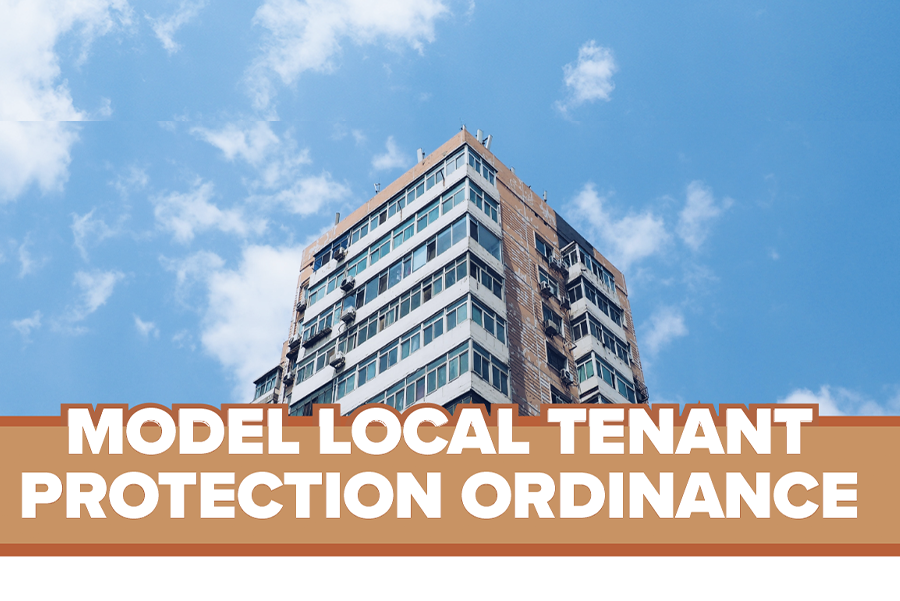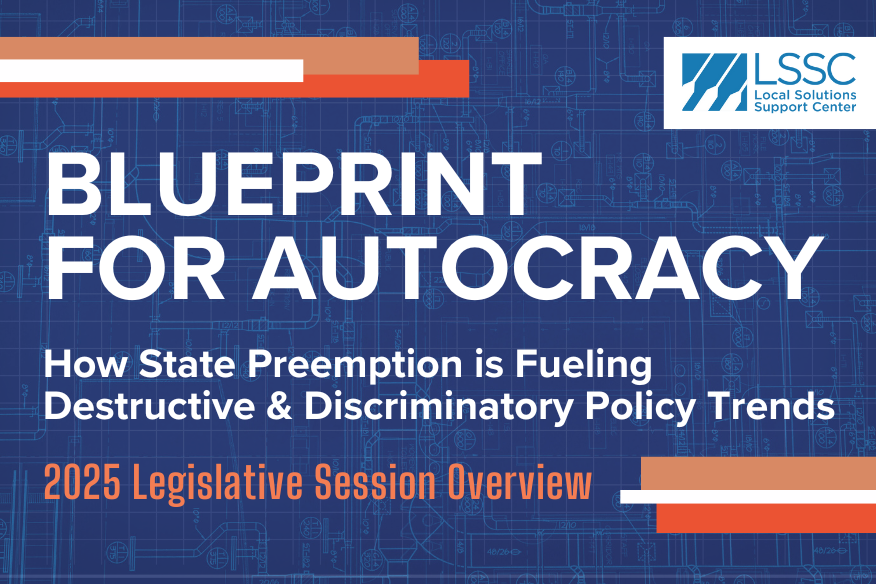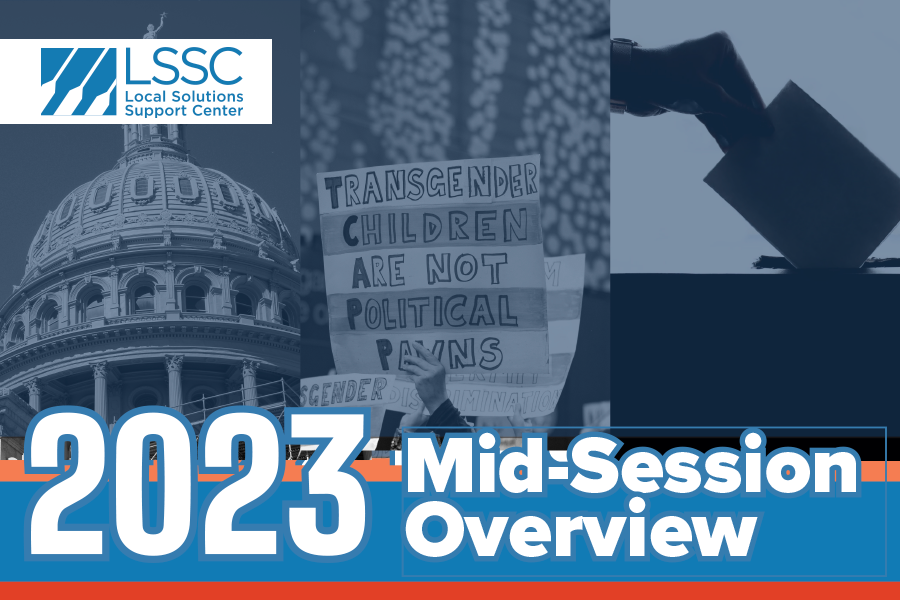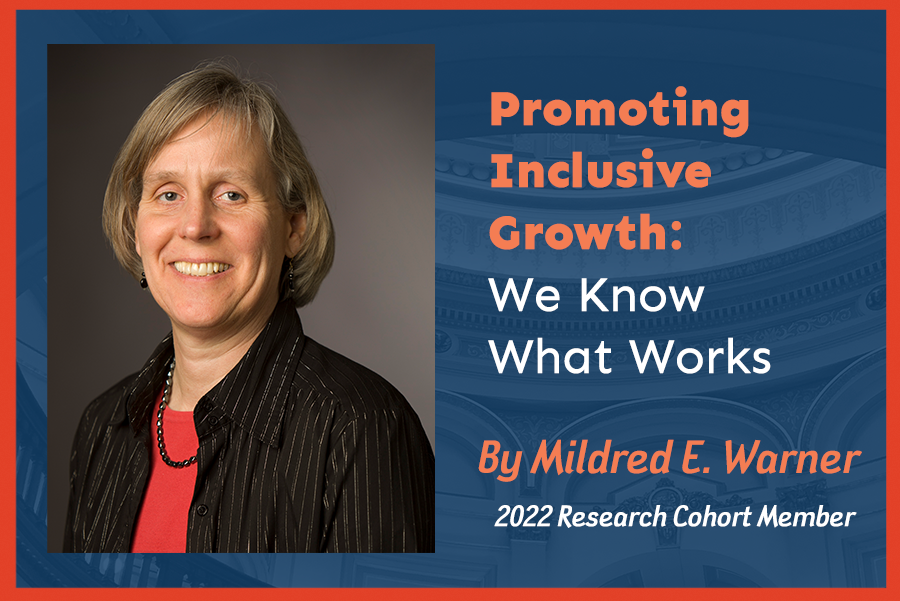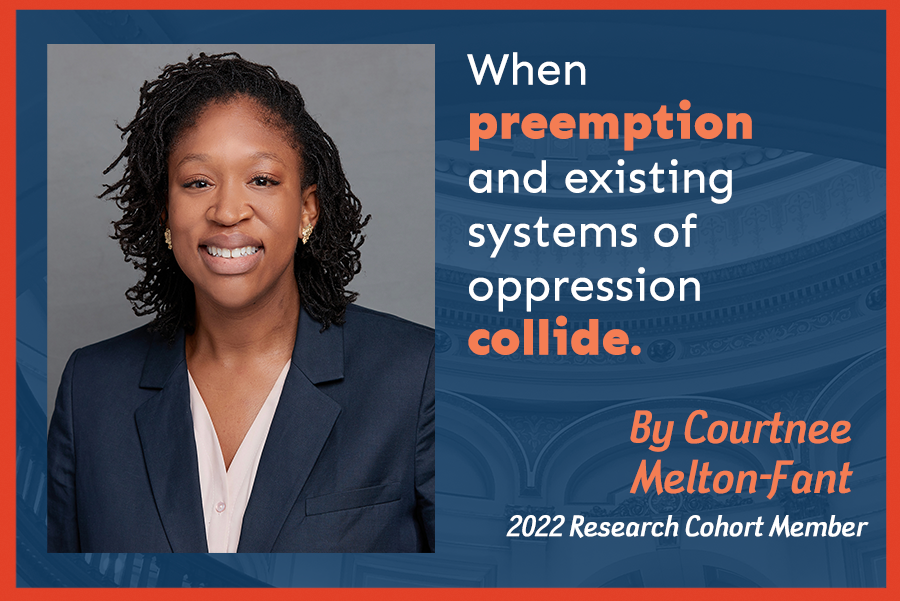It will take more than a favorable court decision or a well-argued opinion piece to counter growing state interference in local decision making and standard setting. At Local Solutions Support Center, we have learned that it takes the integration and interplay of five strategically-aligned elements to push back successfully on preemption.
LSSC has developed resources within each of these realms designed to help advance your efforts to end state overreach and strengthen the ability of local governments to pass policies that protect health and safety and promote equity. The information, strategies, and tools aggregated here were developed by and for attorneys, elected officials, advocates, and coalitions working to stop the increased misuse of state preemption.
Legal Resources
A new white paper from Local Progress and Local Solutions Support Center (LSSC), Driving Toward Equitable Traffic Enforcement, offers local advocates and policymakers a roadmap for advancing traffic safety policies that promote driving equity - while highlighting preemption-related concerns to keep in mind.
Rick Su, Professor of Law at the University of North Carolina School of Law, has written a new white paper for LSSC that charts the growth and evolution of immigration-related preemption measures in recent years.
A new white paper by Richard Briffault for Local Solutions Support Center (LSSC), Preemption of Local Election Administration, looks at how legislatures are working to advance abusive preemption measures designed to burden LEOs and limit their ability to promote democracy.
This paper is a brief update to our earlier white paper, “Preempting Progress: States Take Aim at Local Prosecutors,” cataloging attempts to curtail the discretion of local prosecutors. In this update, we also address successful efforts to push back against the efforts to strip power from local prosecutors and the communities that elected them.
In a new paper from A Better Balance, Local Solutions Support Center, and Equality Federation, we trace the local roots of LGBTQ+ equality in the United States and highlight the different types of abusive preemption that target local authority to protect LGBTQ+ individuals.
Some states have begun to use preemption to force localities to criminalize camping in public, taking local resources away from proven solutions that could address the root causes of homelessness. Rather than solve the crisis, this preemption exacerbates it by punishing people who can find shelter nowhere else.
SSC’s new 2022 Mid-Session report looks at how state elected officials are continuing to undermine local authority on topics ranging from educational curriculum to voting rights to labor laws to LGBTQ equality.
This model ordinance can serve as a guide for local elected officials in their attempts to enact tenant protections in their city or town.
The Local Solutions Support Center has compiled short memos summarizing the nature and scope of local authority in each state.
This groundbreaking new framework lays out a vision for rebalancing state and local relations, and provides model constitutional language to encourage legal reform.
Legislative Session Reports
State lawmakers pushed more than 800 abusive preemption bills across 48 states in 2025. Many of the preemption hotspots the LSSC team tracked - from immigration to anti-DEI efforts - align with the Trump administration’s rhetoric. In fact, it’s impossible to tell the story of preemption in 2025 without considering the impact of the new administration on policy making and people.
As many 2025 state legislative sessions come to a close, abusive preemption once again threatens local control of a number of issues. Across the country, states continue to advance legislation that interferes with the ability of local governments to tailor local solutions for local needs.
Local Solutions Support Center (LSSC) is tracking nearly 600 abusive preemption bills so far this year - a significantly higher number of bills than our team identified in all of 2024. The new federal landscape is emboldening state lawmakers to advance harmful preemption bills - with a particular focus on anti-immigrant, anti-LGBTQ+, and anti-DEI legislation.
Our new report, Preemption’s Role in Undermining American Democracy: 2024 Legislative Session Overview, tracks the 411 abusive preemption bills LSSC identified nationwide this year across 16 different issue spaces. This report explores the major areas of everyday life where lawmakers and corporations are advancing preemption in an effort to undermine democracy.
LSSC’s latest report, Protecting Local Democracy: 2023 Legislative Session Overview, explores all the preemption trends that played out in states across the country this past year. The report also highlights what issues advocates are most concerned about as we head into 2024.
The scope of abusive preemption bills is widening – from Death Star preemption; to efforts to undermine the power of reform-oriented prosecutors; to discriminating against transgender youth; to making it harder for local officials to successfully conduct elections. LSSC’s mid-session report explores the top trends we’re tracking so far this session, as well as a few promising victories that advocates are securing.
Despite the growing threat of abusive preemption, LSSC and our partners across the country secured important wins in 2022 – in state houses, in the courts, and in organizing spaces. We learned lessons and developed best practices that are already strengthening our work as the national hub countering abusive preemption and strengthening democracy as we head into 2023. This new report highlights some of the Local Solutions Support Center’s key activities to support the field and push back against abusive preemption in 2022.
In this report, LSSC tracks how abusive preemption was used during the 2022 legislative session by state lawmakers at the behest of corporations to undermine local authority, particularly on public health authority, LGBTQ rights, and democracy & voting rights.
SSC’s new 2022 Mid-Session report looks at how state elected officials are continuing to undermine local authority on topics ranging from educational curriculum to voting rights to labor laws to LGBTQ equality.
2021 was an unprecedented year for abusive preemption. As local elected officials and advocates sought to protect their communities from the ongoing public health and economic effects of the pandemic, they encountered preemption efforts from state lawmakers on a scale never before seen.
The Local Solutions Support Center’s (LSSC) report explores 2021 legislative activity in more detail. Overall in the session, LSSC tracked over 400 preemption bills – more than two times the number of bills tracked during the 2019 session.
This report reveals how the growing abuse of preemption over the last decade forced many municipalities to start from behind when responding to the pandemic, and highlights the issue areas advocates are preparing to defend from state interference in the months ahead.
Communications & Messaging Resources
These message frames, addendums to Connecting the Dots: How to Message the Abuse of State Preemption, are designed to help you talk about preemption through different lenses and to different audiences.
Home rule reform, like abusive preemption, can be difficult to explain – even if you’re doing this work day-in and day-out. That’s why our national table is releasing new message guidance to help advocates make the case for home rule reform and move people to action. This guidance is meant to help you explain what home rule reform is and why action is urgently needed now.
This guide reflects the latest messaging for how to talk about the abuse of state preemption and how many elected officials use preemption to entrench inequities and take power away from people and communities.
The Local Solutions Support Center has designed a toolkit to help organizers understand what public health authority preemption looks like and how to talk about it in a way that’s both accessible to broader audiences, and effective.
This polling from the African-American Research Collaborative found that it is most helpful to engage voters through a policy position and then transition to a discussion of how to influence state government to make positive change.
In recent years the Local Solutions Support Center has partnered repeatedly with The Campaign Workshop to create message-tested digital advertising toolkits for local partners.
This message guide will help you explain how existing and new state preemption has left local governments and people vulnerable to the pandemic, worsened inequities, and weakened efforts to protect public health.
This webinar features the results of research about preemption and home rule, published in November 2019.
Working closely with the Local Solutions Support Center, PerryUndem conducted six focus groups with voters in late May-early June 2019 to test messages about preemption and home rule.
This webinar, presented August 12, 2019, focuses on messaging research about preemption.
When it comes to their views on government and passing new laws or ordinances, Florida voters tend to take a more positive view of local government than of state government. Full results.
A recent statewide survey reveals that Florida voters have a more favorable opinion of local governments, such as City Councils or County Commissions, than they do of the Florida State Legislature and believe local governments are better connected to the community than state government.
This guide provides topline messages, best examples, and language do’s and don’ts to keep in mind when talking about home rule.
This guide provides topline messages, best examples, and language do’s and don’ts to keep in mind when talking about preemption.
Across the United States, local governments have developed and implemented innovative solutions to improve their communities, and in some cases, that has led to wider adoption of those policies by other communities or even the state.
This slideshow summarizes a 2019 survey of Missouri voters on preemption-related issues.
This slideshow summarizes a 2019 survey of Minnesota voters on preemption-related issues.
This slideshow summarizes a 2019 survey of Florida voters on preemption-related issues.
This slideshow summarizes a 2019 survey of Texas voters on preemption-related issues.
This is the summary of the findings from research based on 17 In-depth (live telephone) interviews conducted in total, including with members of Republican state legislatures.
Organizing, Education & Outreach Resources
We Decide TN is a coalition of groups from across TN, brought together to empower local communities against state interference.
The purpose of this summer series will be to provide insight on how the LSSC team works together to provide resources to the field to address preemption and upholding local democracy.
In recent years the Local Solutions Support Center has partnered repeatedly with The Campaign Workshop to create message-tested digital advertising toolkits for local partners.
On April 30, Odessa Kelly and Whitney Washington at Stand Up Nashville; Kelly Sue Waller at Bedford County Listening Project; and Bennett Foster at Memphis for All hosted a webinar focused on the Tennessee Campaign to Suspend State Preemption During COVID-19 Public Health Crisis.
Kim Haddow at Local Solutions Support Center; Desiree Westlund Cindric at United for a New Economy; and Laura Huizar at Local Solutions Support Center and the National Employment Law Center hosted a webinar focused on lessons learned from efforts to repeal preemption laws.
In this webinar from September 25, 2019, Ida Eskamani of Organize Florida presents on preemption work during Florida’s 2019 legislative session.
LSSC helps to coordinate and create opportunities to counter the increasing state abuse of preemption and working to strengthen local democracies so they have they have the authority they need to protect and promote the health and safety of their residents.
You name it, and preemption can likely touch it. Most states have some form of preemption laws on their books.
This guide provides topline messages, best examples, and language do’s and don’ts to keep in mind when talking about preemption.
Cities and counties may have legal options to counter this growing reality of state interference, even though it can be difficult in many situations to challenge state preemption.
Research Resources
State lawmakers pushed more than 800 abusive preemption bills across 48 states in 2025. Many of the preemption hotspots the LSSC team tracked - from immigration to anti-DEI efforts - align with the Trump administration’s rhetoric. In fact, it’s impossible to tell the story of preemption in 2025 without considering the impact of the new administration on policy making and people.
Since 2012, a growing number of states and municipalities have taken action to protect LGBTQ+ youth from the dangerous and discredited practice of conversion “therapy.” But in recent years, amid escalating political attacks on LGBTQ+ people across virtually every aspect of life, there are also growing attacks on these protections—including through abusive preemption tactics.
The Local Solutions Support Center has updated its resource offering brief summaries of peer-reviewed empirical studies and select additional research demonstrating the impact of these laws.
Local Solutions Support Center (LSSC) is tracking nearly 600 abusive preemption bills so far this year - a significantly higher number of bills than our team identified in all of 2024. The new federal landscape is emboldening state lawmakers to advance harmful preemption bills - with a particular focus on anti-immigrant, anti-LGBTQ+, and anti-DEI legislation.
The fourth edition of The Local Power & Politics Review explores how abusive preemption legislation has permeated so many areas of American policy. The new edition covers a wide range of issue areas – from abortion access to local environmental action to LGBTQ+ equality to prosecutorial discretion.
Our new report, Preemption’s Role in Undermining American Democracy: 2024 Legislative Session Overview, tracks the 411 abusive preemption bills LSSC identified nationwide this year across 16 different issue spaces. This report explores the major areas of everyday life where lawmakers and corporations are advancing preemption in an effort to undermine democracy.
This paper is a brief update to our earlier white paper, “Preempting Progress: States Take Aim at Local Prosecutors,” cataloging attempts to curtail the discretion of local prosecutors. In this update, we also address successful efforts to push back against the efforts to strip power from local prosecutors and the communities that elected them.
“State takeovers of public schools and districts is one prong of a multi-prong approach to dismantling resistance to oppressive legislation,” Steven L. Nelson, Ph.D. writes.
The scope of abusive preemption bills is widening – from Death Star preemption; to efforts to undermine the power of reform-oriented prosecutors; to discriminating against transgender youth; to making it harder for local officials to successfully conduct elections. LSSC’s mid-session report explores the top trends we’re tracking so far this session, as well as a few promising victories that advocates are securing.
This resource from ChangeLab Solutions and the Local Solutions Support Center (LSSC), newly updated for 2023, provides advocates with the research and data they need to document the harmful consequences of preemption and advocate for repealing inequitable preemption laws.
Despite the growing threat of abusive preemption, LSSC and our partners across the country secured important wins in 2022 – in state houses, in the courts, and in organizing spaces. We learned lessons and developed best practices that are already strengthening our work as the national hub countering abusive preemption and strengthening democracy as we head into 2023. This new report highlights some of the Local Solutions Support Center’s key activities to support the field and push back against abusive preemption in 2022.
The third edition of The Local Power & Politics Review features a series of articles that explore how abusive preemption legislation has impacted states across the country. The new edition covers a wide range of issue areas – from public health policy to local environmental action to public schools to public safety to elections.
Ramón Cruz, President of the Sierra Club, explores how some state legislatures are targeting private financial institutions in order to boycott or penalize them simply for adopting measures that consider climate change in their investments, constituting a preemption effort against proactive climate action.
Preeti Chauhan explores how some prosecutors are using their own discretion to create a less punitive and a more fair and equitable criminal legal system – and how state preemption can impact their ability to do so.
Mildred E. Warner of Cornell University explores how abusive state preemption legislation suppresses wages, undermining inclusive growth. Warner explains how we can promote more inclusive growth by raising returns to labor.
Courtnee Melton-Fant shares the story of Boxtown, a majority black neighborhood in Memphis harmed by the abuse of preemption.
In this report, LSSC tracks how abusive preemption was used during the 2022 legislative session by state lawmakers at the behest of corporations to undermine local authority, particularly on public health authority, LGBTQ rights, and democracy & voting rights.
“New Jersey is a place with two major stories in land use today,” Noah Kazis writes. “One led by the state against local prerogatives, and one led by localities themselves. Understanding the relationship between those two stories may teach us much about what preemption can and can’t do.”

View Resources by Topic
Use these pages below to segment our resources – and partner resources – by topic area, from immigration to labor to technology.
View Resources By Tag
- Abortion
- Advocates' Memo
- Alabama
- Arizona
- Arkansas
- Broadband Internet
- Building Your Campaign
- California
- Connecticut
- COVID Decision Tree
- COVID-19
- Criminal Justice
- Curriculum
- Death Star 2.0
- Delaware
- Economic Policy Institute
- Education
- End of Session Report
- Energy
- Environment
- Essays
- Fact Sheet
- Florida
- Gas
- Gender
- General
- Georgia
- Guides
- Gun Safety
- Hawaii
- Home Rule
- Home Rule Reform
- Housing
- Idaho
- Illinois
- Immigration
- Indiana
- Iowa
- Kansas
- Kentucky
- Labor
- LGBTQ
- Louisiana
- Maine
- Map
- Maryland
- Masks
- Massachusetts
- Memo
- Michigan
- Minimum Wage
- Minnesota
- Mississippi
- Missouri
- Model Policy
- Montana
- National Polling
- Nebraska
- Nevada
- New Jersey
- New Mexico
- North Carolina
- North Dakota
- Ohio
- Oklahoma
- Oregon
- Paid Sick Leave
- Pennsylvania
- Policing
- Produced with A Better Balance
- Produced with EARN
- Protesting
- Public Education
- Public Health
- Racial Justice
- Rent Control
- Report
- Research Cohort Blog Series - 2022
- Research Cohort Blog Series – 2025
- Resource Collection
- Schools
- South Carolina
- State Polling
- Taxes
- Technology
- Tennessee
- Texas
- Transgender
- Urban Institute
- Utah
- Vaccines
- Vermont
- Virginia
- Virtual Trainings
- Voting
- Washington
- West Virginia
- White Paper
- Wisconsin
- Wyoming









